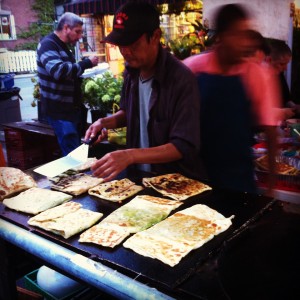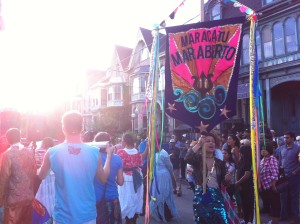
Artist Spotlight: Maracatu Mar Aberto
 This past weekend was the Cabbagetown Festival, a community event with street vendors, a craft fair, lots of yard sales, food vendors, and music. ((Almost entirely awful cover bands, much to my dismay. But there were a couple of good acts – read on!)) Luckily enough for me, the whole thing took place right outside my door, so I spent most the two days strolling around, noshing on murtabek and roti, and meeting some of my neighbours. ((I even met a guy who has a bee hive in his back yard, who sold me a jar of Cabbagetown Gold – illegal bees make the best honey!))
This past weekend was the Cabbagetown Festival, a community event with street vendors, a craft fair, lots of yard sales, food vendors, and music. ((Almost entirely awful cover bands, much to my dismay. But there were a couple of good acts – read on!)) Luckily enough for me, the whole thing took place right outside my door, so I spent most the two days strolling around, noshing on murtabek and roti, and meeting some of my neighbours. ((I even met a guy who has a bee hive in his back yard, who sold me a jar of Cabbagetown Gold – illegal bees make the best honey!))
Things were winding down a bit, and I’d returned to my kitchen to do a little baking. ((The Autumnal weather always prompts me to bake muffins, pies, all sorts of things.)) I was just about to put some muffins in the oven, when I heard the sound of the drums reverberating through the neighbourhood. I turned off the oven and ran to find Maracatu Mar Aberto over on Carlton Street. ((Don’t worry – I went back later and baked them. Those muffins are delicious!))
 I love Maracatu, a drum-based genre of music and performance from Northern Brazil that often includes carnival-like elements – costumes, dancing, and street performance ((Fans of the Peterborough Folk Festival will remember that I’ve booked Aline Morales‘ Maracatu group – now Baque de Bamba – ‘way back in 2008.)) – and has a long and storied history that’s pretty fascinating. I often feel that performers who understand the history and context of their art are better at performing it, and I get the sense that it’s particularly true for Maracatu Mar Aberto. Even their name speaks to the history of the music – Mar Aberto means ‘open sea,’ referring to the movement and development of this tradition between Africa and Brazil, and now to Canada.
I love Maracatu, a drum-based genre of music and performance from Northern Brazil that often includes carnival-like elements – costumes, dancing, and street performance ((Fans of the Peterborough Folk Festival will remember that I’ve booked Aline Morales‘ Maracatu group – now Baque de Bamba – ‘way back in 2008.)) – and has a long and storied history that’s pretty fascinating. I often feel that performers who understand the history and context of their art are better at performing it, and I get the sense that it’s particularly true for Maracatu Mar Aberto. Even their name speaks to the history of the music – Mar Aberto means ‘open sea,’ referring to the movement and development of this tradition between Africa and Brazil, and now to Canada.
 Maracatu seems to be a very community-minded type of genre, which isn’t to say that it’s unprofessional or sloppily performed. It’s the kind of music that invites people to be involved, to dance and sing, and the way Maracatu Mar Aberto presents themselves is both very serious about the music, the history, and the tradition, but very welcoming, inviting, and inclusive.
Maracatu seems to be a very community-minded type of genre, which isn’t to say that it’s unprofessional or sloppily performed. It’s the kind of music that invites people to be involved, to dance and sing, and the way Maracatu Mar Aberto presents themselves is both very serious about the music, the history, and the tradition, but very welcoming, inviting, and inclusive.
With Alex Bordokas, the group’s founder, doing most of the call-and-response vocals in Portuguese and the between-song patter in English, and the dancers and standard-bearers encouraged the audience to participate. From costumed little kids to the King and Queen, the performance felt like coming home. A much dancier, more colourful home than the little village that I grew up in.
Maracatu Mar Aberto is, in many ways, a community group – they run weekly workshops to teach Maracatu styles, and seem to involve people from all backgrounds and walks of life. It’s a real joy to be around, and the crowd gathered at Carlton and Parliament Streets didn’t want the performance to end.
It’s pretty difficult to get an idea of the celebratory and welcoming nature of a Maracatu Mar Aberto performance in any way except being there, but here’s a pretty good video from earlier this year:


